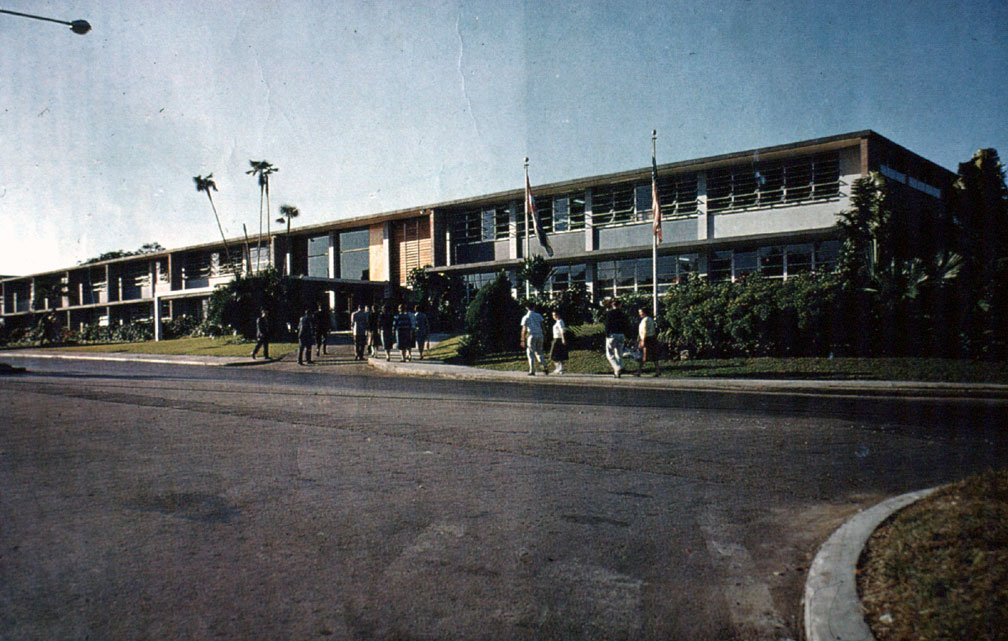



Ruston Academy was a well known coeducational school in Havana, Cuba between 1920 and 1961. Founded by Hiram H. Ruston, an American educator with an international vision and a commitment to individual-centered education, the school opened with a student body of three in 1920. Prior to its confiscation by the Castro government in 1961, Ruston Academy had an enrollment of 750 students.
Ruston Academy created a multicultural, bilingual elementary and secondary educational program rated as the best among all American schools in Latin America. Its recognized excellence was the result of committed and dedicated educators, who worked to create the environment and stimulus needed to foster and nurture self-discipline, analytical and independent thinking, cultural sensitivity and the inculcation of strong individual values.
The following excerpts from statements by a Ruston student and a faculty member identify some of the most important traits of the school and the experiences of those who worked or studied there. These are taken from Ruston: From Dreams to Reality written by James D. Baker.
Mr. Baker: “Love Cuba and the United States”
He expected us to become good citizens and to respect the rights of others.
Despite almost 25 years as a teacher first and then as headmaster of the best bi-lingual private school in pre-Castro's Cuba, James D. Baker never spoke Spanish fluently. He didn't have an ear for the language. He had difficulty with those harsh double Rs Cubans like to trill. It was not easy for him to deal with Spanish-language syntax, either.
What Mr. Baker did have was a special skill in creating a learning atmosphere where children from kindergarten through 12th grade never thought of themselves as cubanos or americanos, as Catholics, Protestants or Jews. What he had was a love of children, of their potential. He was an American, proud of his heritage and strong in his beliefs and love of country. He also loved Cuba, with all his heart.
To those of us who studied under him, we were all alike. We were students at Ruston Academy, with a goal of going on to college in the United States or to the university in Cuba. The school's credo was to teach us English and Spanish equally well, with an emphasis on where we wanted to go and what we wanted to do after high school.
The academic curriculum was tough, the standards high. Beyond that, Mr. Baker expected us to become good citizens, to respect the rights of others, to appreciate and understand the beauty of democracy, and to love Cuba and the United States equally. He taught all of us that you didn't have to stop loving one to care for the other.
Two flags were always present at school functions: the Cuban flag, next to the American flag. We sang both anthems. We were taught to respect the history and culture of both countries. There were few medals or prizes for achievements at the school. The only award given was to the graduating senior who best exemplified the spirit of democracy and love for things Cuban and American.
So high were the standards at Ruston Academy that many graduates attended Ivy League schools or top technical universities. Many students -- driven out of Cuba by communism -- became important pillars of this community. Others are scattered throughout the United States, Latin America and Europe. Florida International University President Modesto Maidique is a Ruston Academy alumnus. So are attorney George Harper, investment banker Fred Berens, community activist Bernardo Benes and the Rev. William Skilton, Episcopal bishop of South Carolina.
There are others, many others. We all speak English and Spanish. We never think of each other as Americans or Cubans, only as friends, as classmates who shared a beautiful dream while we were growing up together.
Guillermo I. Martínez
Class of 1959
Miami Herald
March 2, 2001
Trabajar en el Ruston era un privilegio y una responsabilidad. Era la oportunidad, pero también con el compromiso, de participar en una empresa de altos vuelos académicos e ideológicos. Prestigio mantenido gracias al intercambio de ideas con aquellos que contribuían a funcionar como mentores, tanto del alumnado como entre el profesorado.
Hay que tener en cuenta que la calidad y dedicación de los alumnos eran inmejorables. Y, dedicarse a la enseñanza de alumnos altamente motivados, no solamente es un privilegio, sino una experiencia extraordinariamente estimulante, sobre todo para los maestros que aman su profesión.
Se contaba además con la cooperación de la familia de los alumnos. Aquellos que escogían el Ruston como escuela para sus hijos, propiciaban no solamente la adquisición de conocimientos, sino la asimilación de los valores cívicos y morales que deben existir en una institución dedicada a la educación de las generaciones futuras.
Mario Iglesias
Assistant Director of the Lower
School, 1945-1961